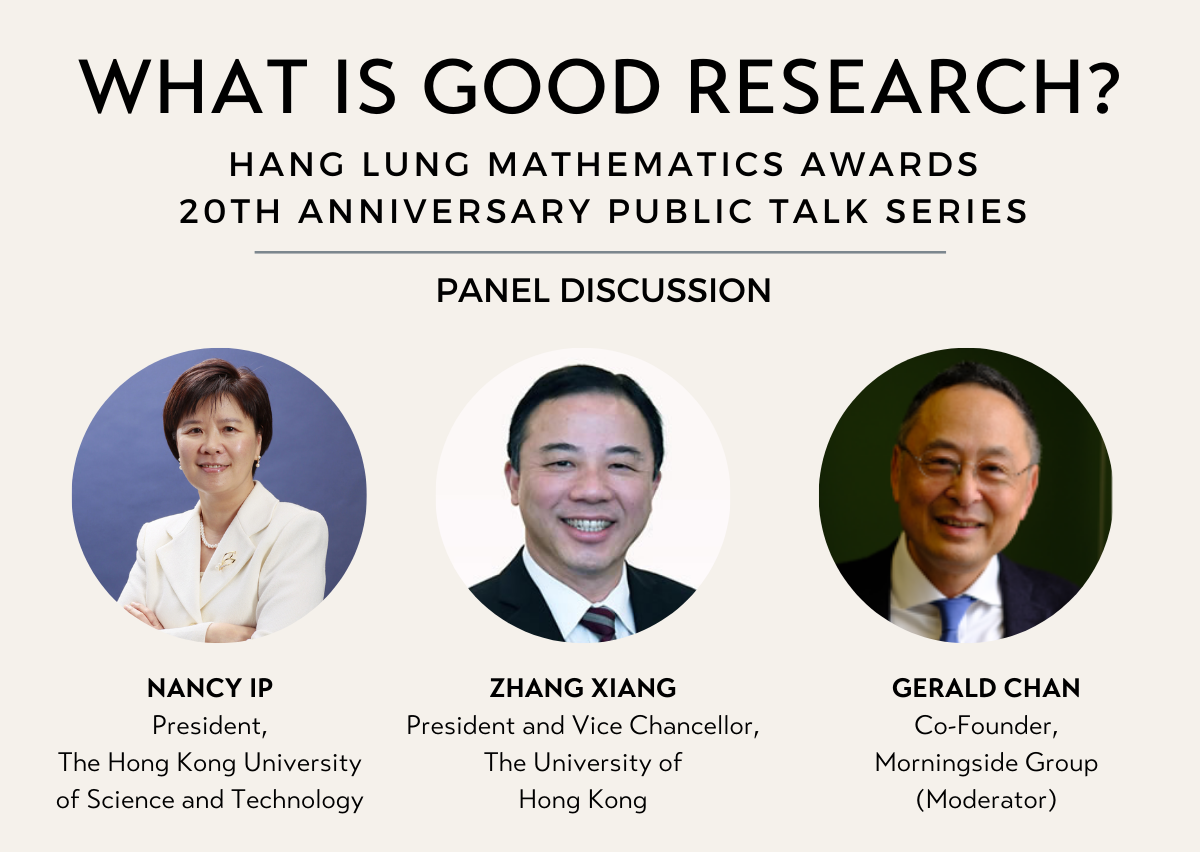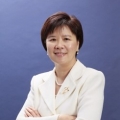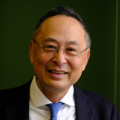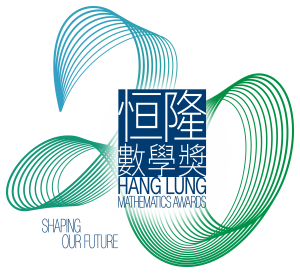What is Good Research?
VIEW EVENT DETAILSHang Lung Mathematics Awards 20th Anniversary Public Talk Series

RUNDOWN
17:00 Registration
17:30 Opening Remarks
17:35 Panel Discussion
18:15 Q&A
18:45 Closing Remarks
18:50 End
This program is free of charge; registration is required.
To commemorate 20 years of the Hang Lung Mathematics Awards (HLMA), Hang Lung Properties, in collaboration with Asia Society Hong Kong Center, is presenting a series of public talks over the coming year under the theme “Shaping our Future”, aiming to underscore the significance and importance of basic sciences in our rapidly evolving world.
The inaugural event for this series is a panel discussion featuring two university presidents, Prof. Nancy Ip, President of the Hong Kong University of Science and Technology and Prof. Zhang Xiang, President and Vice Chancellor of the University of Hong Kong, in conversation with Dr. Gerald Chan, Co-Founder of the Morningside Group, on "What is Good Research".
For more information about Hang Lung Mathematics Awards, please visit https://hlma.hanglung.com/en.

Professor Nancy Y. IP is the President of The Hong Kong University of Science and Technology (HKUST) and the Morningside Professor of Life Science. Taking office in October 2022, she is the first female president of a publicly funded university in Hong Kong.
Professor Ip received her PhD degree in Pharmacology from Harvard University, after which she held the position of Senior Staff Scientist at Regeneron Pharmaceuticals Inc. in New York. Since joining HKUST in 1993, she has served as the Vice-President for Research and Development, the Dean of Science, and the Head of Biochemistry. She continues to serve as the Director of the State Key Laboratory of Molecular Neuroscience.
Professor Ip is world-renowned for her significant contributions to the field of neuroscience in understanding the complex mechanisms that underlie proper brain functions, as well as drug discovery for neurodegenerative diseases. Her outstanding research has resulted in over 330 scientific papers, that have garnered more than 45,200 SCI citations, as well as over 70 patents. She was invited to present over 300 scientific lectures at international conferences and institutions.
As a distinguished neuroscientist, Professor Ip has been elected to various academies, including the Chinese Academy of Sciences, the US National Academy of Sciences, the American Academy of Arts and Sciences, the World Academy of Sciences, the Chinese Academy of Medical Sciences, and the Hong Kong Academy of Sciences.
In recognition of her excellence in science, she has received numerous awards and honors. She received the L’OREAL-UNESCO for Women in Science Award for her discoveries on the molecular control of growth, differentiation, and synapse formation in the nervous system. She was the first Chinese scientist in the Life Sciences to receive this distinguished award. She was also bestowed the title and rank of “Chevalier de l'Ordre National du Mérite” (National Order of Merit) by the French Government in recognition of her scientific contribution to the community. Her other notable awards include the Croucher Foundation Senior Research Fellowship, the National Natural Science Awards, the Honors for Women Innovators at the APEC Women and Economy Summit, and the “10 Science Stars of China” by Nature. She has also received the Silver Bauhinia Star, Bronze Bauhinia Star, Justice of Peace, and the Medal of Honor from the Hong Kong SAR Government.
Recognized for her commitment to promoting science education and research, Professor Ip was elected as a councilor by the Society for Neuroscience (SfN) in 2010, an esteemed international professional organization with around 40,000 members in the field of neuroscience. She was the first international member elected to SfN’s council. Professor Ip also helps steer research policy on a global level. She has been invited to serve on different councils of the World Economic Forum (WEF) including the Global Agenda Council on Neuroscience and Behavior and the Global Future Council on the Future of Neurotechnologies and Brain Science. Additionally, she is a member of various strategic initiatives such as the Leadership Group of the WEF Davos Alzheimer’s Collaborative. She also actively serves on local committees, such as the Chief Executive’s Council of Advisers, to help steer the strategic development of Hong Kong. Moreover, as the Council Chair and founding member of the Greater Bay Area Association of Academicians, she fosters cooperation among academics in Hong Kong and the Mainland, to help advance science and technology in the Greater Bay Area.

Professor Xiang Zhang assumed office as the 16th President and Vice-Chancellor of the University of Hong Kong (HKU) in July 2018. Prior to joining HKU, Professor Zhang was the inaugural Ernest S. Kuh Endowed Chair Professor at the University of California, Berkeley, and the Director of the US National Science Foundation Nano-scale Science and Engineering Center (SINAM). He has also served as the Director of Materials Science Division at Lawrence Berkeley National Laboratory (LBNL).
Professor Zhang is an elected member of the US National Academy of Engineering (NAE) and of Academia Sinica, a foreign member of the Chinese Academy of Sciences, and a Fellow of the American Physical Society (APS), the Optical Society of America (OSA), the American Association for the Advancement of Science (AAAS), and the International Society of Optical Engineering (SPIE).
Professor Zhang received his PhD from UC Berkeley (1996), MS from the University of Minnesota and MS/BS from Nanjing University, China. He was an assistant professor at Pennsylvania State University (1996-1999), and associate professor and full professor at UCLA (1999-2004) prior to joining Berkeley's faculty in 2004.
Professor Zhang's research focuses on materials physics, metamaterials and nano-photonics. He has published over 390 journal papers including over 90 publications in Science and Nature family series. He has given over 350 Keynote, Plenary and Invited talks at international conferences and institutions. He was a Co-Chair of the NSF Nano-scale Science and Engineering Annual Grantee Conferences in 2004 and 2005, and has served as Chair of the Academic Advisory Board for the Research Center for Applied Science (RCAS), Academia Sinica.
In 2008, Professor Zhang's research was selected by Time Magazine as one of the "Top Ten Scientific Discoveries of the Year" and "50 Best Inventions of the Year", Discover Magazine's "Top 100 Science Stories" in 2007, and R&D Magazine's top 25 Most Innovative Products of 2006. His research has been frequently featured in international media, including the BBC, CNN, ABC, New York Times, and Wall Street Journal. In 2019, his research team's work on "Casimir effect" was selected as one of the Top 10 Breakthroughs for 2019 by Physics World.
Professor Zhang is a recipient of the NSF CAREER Award (1997), the SME Dell K. Allen Outstanding Young Engineer Award (1998) and the ONR Young Investigator Award (1999). He was awarded the Chancellor's Professorship by UC Berkeley (2004-2009), named Rohsenow Lecturer at MIT (2009) and William Reynolds Lecturer at Stanford (2012), and in 2017, chosen for the Pearsall Distinguished Lecturer at Duke, the Hall Engineering Lecturer at Vanderbilt, and the Towers Distinguished Lecturer at Michigan Tech. In 2011, he was awarded the Fred Kavli Distinguished Lectureship by the Materials Research Society (MRS), the Miller Professorship by UC Berkeley, and named Distinguished Visiting Scientist (DVS) by the University of Toronto. He was awarded the Fitzroy Medal in 2014, the Charles Russ Richards Memorial Award in 2015, the Max Born Award from the Optical Society of America in 2016, the Julius Springer Prize for Applied Physics in 2016, the Excellence Award in Scientific Leadership in 2016, the A. C. Eringen Medal from the Society of Engineering Science in 2017, and the 2021 SPIE Mozi Award from the International Society for Optics and Photonics.

Dr. Gerald Chan ScD co-founded the investment firm Morningside and has been an active venture investor in technology and life science. He currently is chairman of the board of Apellis, a Nasdaq listed biotech company, in addition to being a board member of a number of non-listed biotech and digital health companies, among them, Linus Health, Prescryptive Health, Vesigen, Neutrolis, and Cognito Therapeutics. He is a sought-after advisor in science and innovation policies, being a member of the Scientific Advisory Board of Brigham and Women Hospital, a Harvard University teaching hospital, and the Dean’s Board of Advisors of Harvard T.H. Chan School of Public Health, a trustee of Scripps Research Institute in California, and formerly the Chair of the Innovation Advisory Committee of Wellcome Trust in London. He was schooled in Hong Kong before studying Engineering at UCLA followed by a Master’s degree in Medical Physics and a Doctor of Science degree in Radiation Biology from Harvard University and a post-doctoral fellowship in Pathology at Dana Farber Cancer Institute. He holds an Honorary Professorship in Translational Medicine at University of Manchester, and fellowships at Wolfson College, Oxford University and Trinity College, Cambridge University. Seven universities in Hong Kong, UK and America have awarded him honorary doctoral degrees, most recently King’s College London. In 2017, he was elected to a fellowship in the American Academy of Arts and Sciences.
Organized by:

Strategic Partner:

The views and opinions expressed are those of the speakers and participants and, unless expressly stated to the contrary, do not reflect the opinion, position or official policy of Asia Society Hong Kong, its members, or its committees. Asia Society Hong Kong does not endorse or approve, and assumes no responsibility for the content of the information presented.
Event Details
The Hong Kong Jockey Club Hall, Asia Society Hong Kong Center